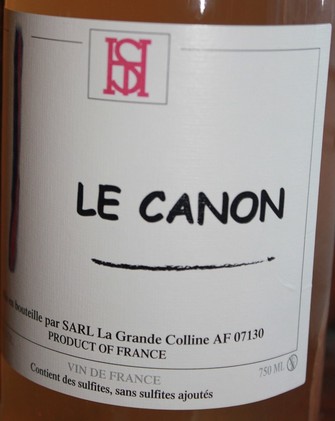
by Patrick Ogle
Le Canon is a rose wine from the Rhone Valley. Unusually it is made from muscat of Hamburg. The gentleman at the wine shop said "It is a wine made by, Hirotake Ooka , a Japanese winemaker in the Northern Rhone." The gentleman then extrapolated on a number of details. I could have responded with "You had me with that first sentence." He also would have had me by saying "muscat of Hamburg."
It almost seems to bubble when you pour it and it smells like a ripe red grapefruit. It tastes like that too (although the grapefruit is more subdued in the taste). There is also a good deal of grapefruit pith here, especially on the finish.
I had a hard time chasing other aspects of this wine. There is something tropical in the background that isn't citrus. The wine has strong acidity too. The CO2 and the acidity make this a lively wine. If you want to pair this with something thing salads and mild cheeses. It almost calls to mind a French farmhouse ale in some ways.
When you look at this wine, and when you know the story and what it is you might expect it to be weirder, to be funkier. It is unusual to be sure but it is also quite accessible-different but accessible. If you expect a mild mannered Provence rose? You are going to be surprised. Yet, if you are expecting to taste dirt and grungy nastiness because it is cloudy? You would be dead wrong as well.
This wine sort of tastes like summer.
It also shows that totally natural wines--no sulfur is added, it is neither fined nor filtered--are not necessarily unapproachable for casual wine drinkers. This wine doesn't even use additions in the vineyard allowed in biodynamic wines. It is pretty close to zero intervention from the winemaker, beyond even biodynamic requirements. This wine is fascinating for those into esoteric wines but people who like wine in a broader sense will not be turned off by it (provided they have an open mind). There is something primal here. It makes you think of the sort of fermented beverage the first people fermenting beverages might have tasted.
With the emphasis on non-intervention it is somewhat ironic that the grape used, muscat of Hamburg, is possibly the result of human intervention.

 RSS Feed
RSS Feed